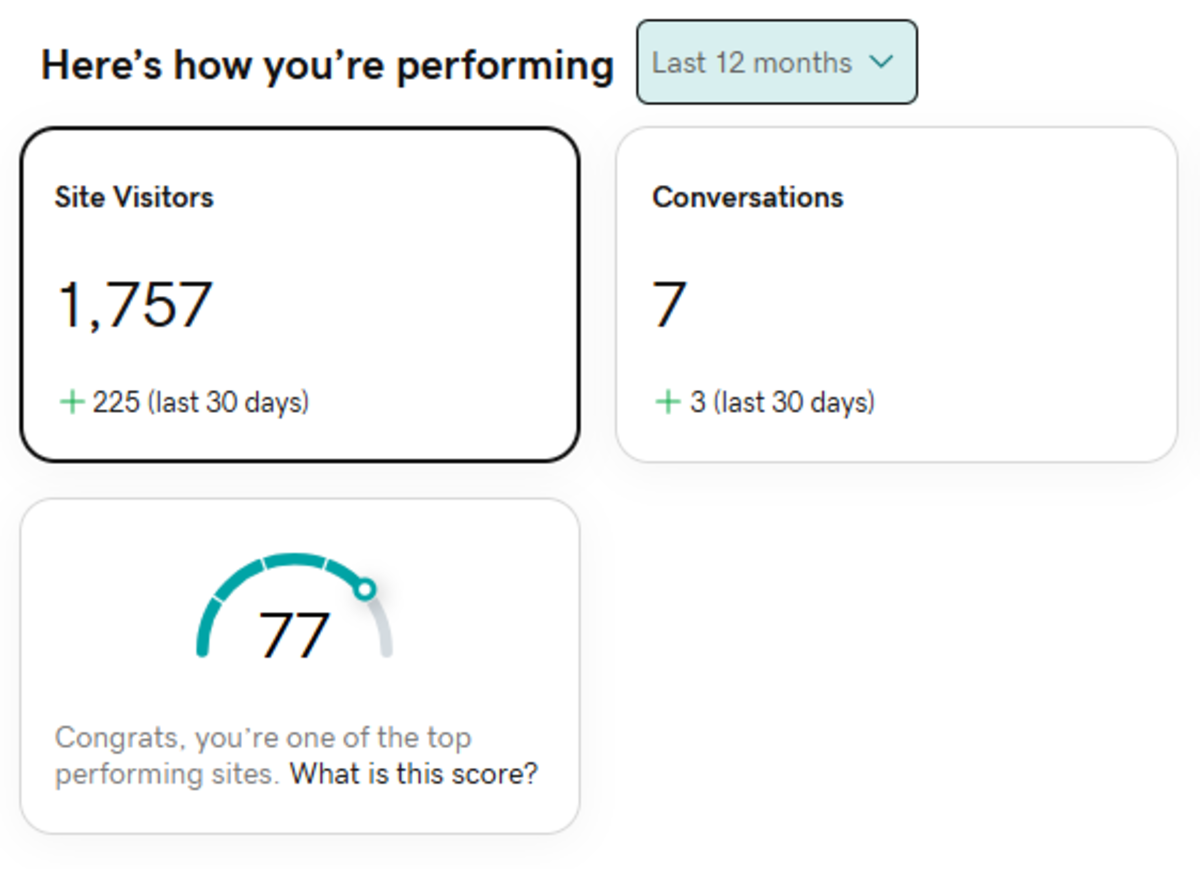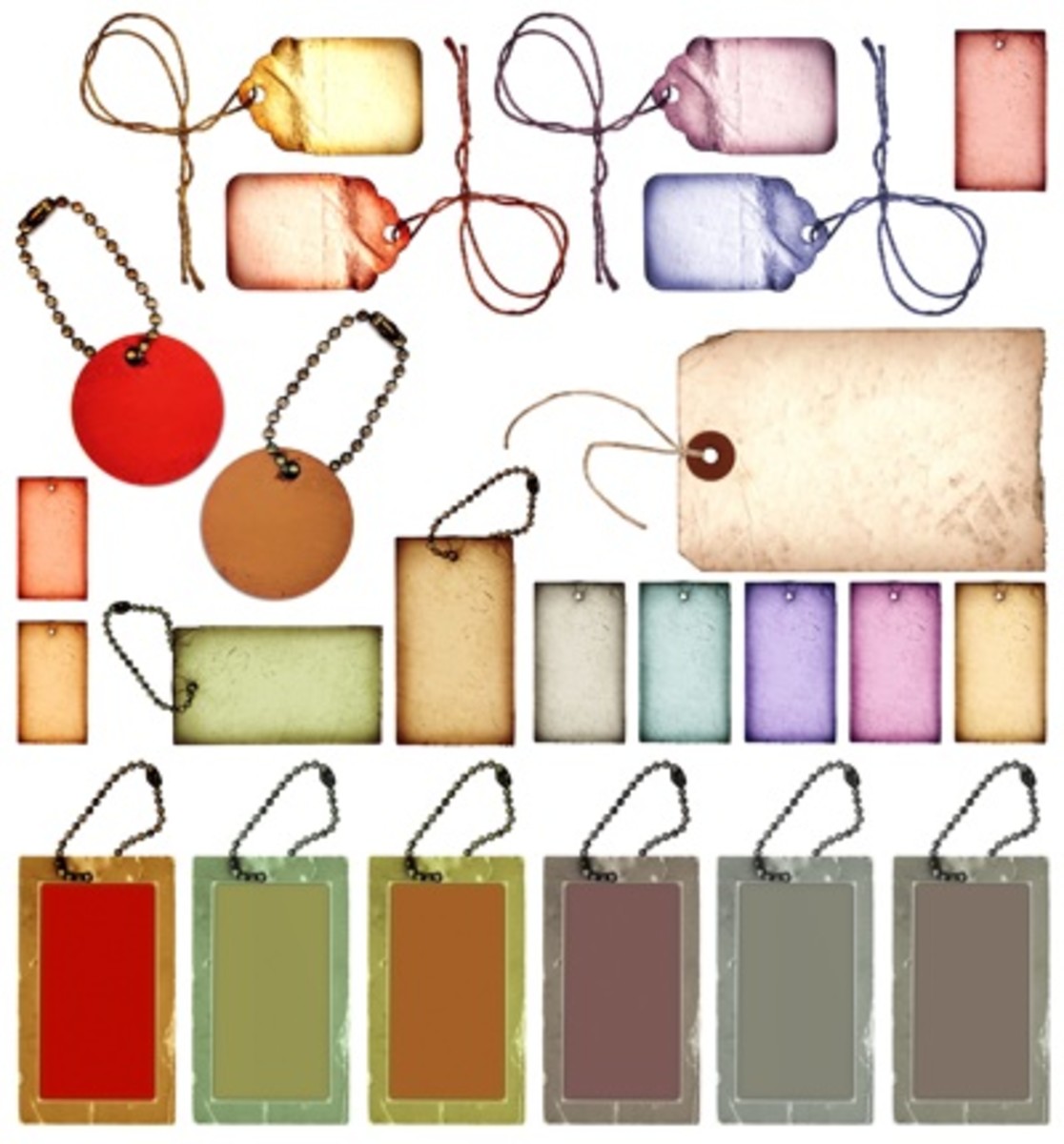CONTENT WRITER | and SEO Copywriting

The Content Writer and SEO Copywriting
The Content Writer produces SEO copywriting for websites. Learn the techniques; find top 10 content writing tips, samples & videos in this free, online guide.
____________________________
The content writer draws the real image of a website. It is the writer who transmits who you are to the eyes of the world.
Your content writer can make or break your website in the opinion of visitors and of search engines.
This article will show you how to succeed as an online content writer and give you the best techniques for SEO copywriting.
Table of Contents
– Jump to Section
The Content Writer and Google Panda
Top 10 Myths for the Content Writer



Content Writer Goals
Beyond the Flash and Splash
Your website must be more than just a pretty face.
The content writer must capture attention within 30 seconds when a visitor lands on your webpage – within ten seconds if your visitor is under the age of 35.
That old adage, time is of the essence, has become the credo of the content writer.
Within just a few seconds, your content writer must:
1. Engage
Your site's homepage or landing page content is critical to your success. If your copy doesn't instantly engage a visitor, he is off to the next site from his Google search results in the blink of an eye and the click of a mouse.
2. Secure trust
The content writing conveys your credibility and integrity to skeptical strangers. If you fail to secure trust, nobody is going to give you his credit card information, pick up the phone to ask about your services, or donate to your nonprofit.
3. Convince
The words on the webpage must sell the visitor. They must persuade him to purchase your product above all others, hire your services not someone else's, or donate to your nonprofit instead of another.
4. Push to the desired action
The Web content writer deploys the power of words to achieve your product, service or non-profit goals. And he must do all of this with tight copy within the space limitations of your site's homepage and the order/signup page.


Keyword Density and SEO Content Writing
SEO Copywriting
SEO copywriting is on the front line of strategy for the search engine optimization of your website. The writer's words must touch the visitor and the search engine robot. Not every writer can make a powerful connection, simultaneously, with both. And, clearly, not every writer willingly attempts SEO writing.
Plus, it takes a ton of study and years of experience to hone the craft of SEO copywriting. The content writer must know far more than just the basics of search engine optimization and apply the precepts accordingly.
The expert Web content writer will also be a keyword specialist; he will know how to choose and how to use them. Keywords must be strategically interwoven in the Web content or people will never find your website from a Google search. They will find your competitors' sites instead.

Writing Meta Description Tags
Writing the meta Description Tag for each article is part of the work of SEO Copywriting. The Description Tag is most often used by the Google search engine as the snippet displayed with the page title on search engine results for a query.
The Description Tag is a power tool in the SEO strategy for a site. In exactly 160 characters including spaces, the Web content writer must explain a webpage on your site and convince someone to click through to your page from search engine results.
The meta Description Tag, about 25-30 words, is difficult to write well. But if the copywriter fails here, coming up #1 on Google for a keyword won't mean a thing. Appearing high on search engine rankings is worthless if nobody clicks on the listing.
A unique meta Description must be written for every page on your website – no duplicate content allowed.
Expertly Written Description Tag

Google and the Description Tag
According to Google's Matt Cutts,
"If the meta Description Tag is really well-written and compelling, then a person who sees it might click through more often."
What he doesn't say in this video is that a low click-through rate will eventually lower a listing in search engine results – all the more reason to put forth your best effort in writing the Description Tags.

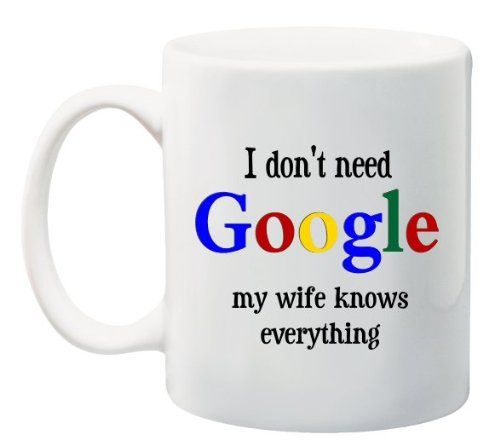

The Content Writer and Google Panda
The Google search engine launched a series of major algorithm changes in February, 2011, known as Panda. The target of these changes was content writers who were spamming the search engine results. In its continual quest to deliver the best results for search queries, Google cracked down on what it considered to be many forms of bad content writing.
Content writers need to understand the Google Panda algorithm and its ramifications for SEO copywriting. Read all about Google Panda SEO and update your copywriting accordingly.

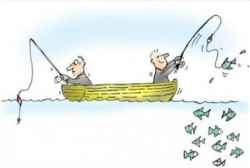
SEO Copywriting and Link Bait
Part of the SEO game plan for any website is to attract inbound links. The actual content on a site is critical to securing high quality links from other websites. In fact, many content articles are commissioned for the sole purpose of being link bait for a website. What this means is that the SEO copywriter is hired to write something so spectacular, controversial or funny, that people will naturally want to share it on social media sites and with their website audience – thus, acquiring inbound links to the content.
Boring won't cut it. Link bait must be significantly unusual. If you want some examples, look at articles written by the biting New York Times reporter Scott Shane or read a snarky Ann Coulter column. What you will find with both of these journalists is a unique slant on a highly competitive, saturated topic. You may not agree with their opinions, but you will probably stand in awe looking at their in-depth research and their captivating way-with-words skills. These are exceptional writers who hold the attention with every word. Study writers like these. Learn from them. Emulate.


Top 10 Myths for the Content Writer
1. "People rarely read Web pages word by word; instead, they scan the page."
2. "Write meaningful sub-headings, not 'clever' ones."
3. "Web pages have to employ scannable text, using bulleted lists."
4. "Write short sentences."
5. "Always use one idea per paragraph, not many ideas."
6. "Use the 'inverted pyramid', newspaper style, starting with the conclusion."
7. "Use half the word count than in conventional writing."
8. "Use a scannable layout for your text."
9. "Use neutral rather than subjective language."
10. "Avoid writing long pages of content because users are reluctant to read more words and scrolling is extra work."
You'll find this mythology reprinted over 10,000 times on the Web because it sits as prominently as a big zit on the nose of the search engine results for major 'content writing' keywords.
The original source for all of this bad advice is a man named Jakob Nielsen who posted this list online, based upon 1996 research, on October 1, 1997. In Internet years, that's downright prehistoric. It was before Google. In 1997, many of the people who had Internet connection were still using monochrome monitors and all of them had dial-up modems.
Take a look at what a modern website looked like in 1997:
1997 Homepage of the United States Census Bureau
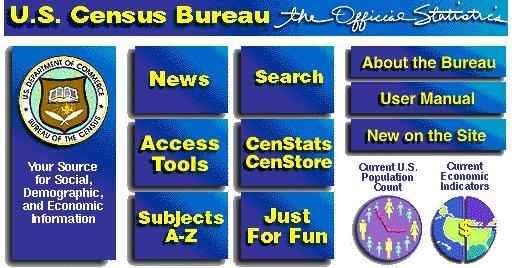
Homepage Evolution: The Same Site in 1999
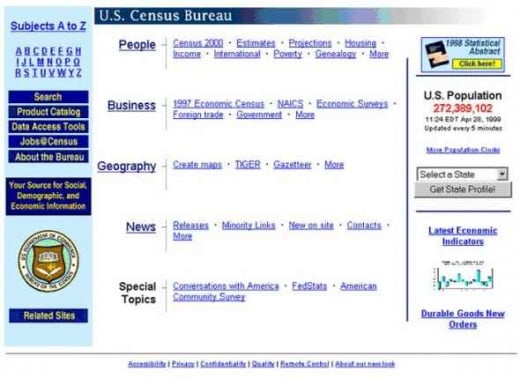
Look At It Now!
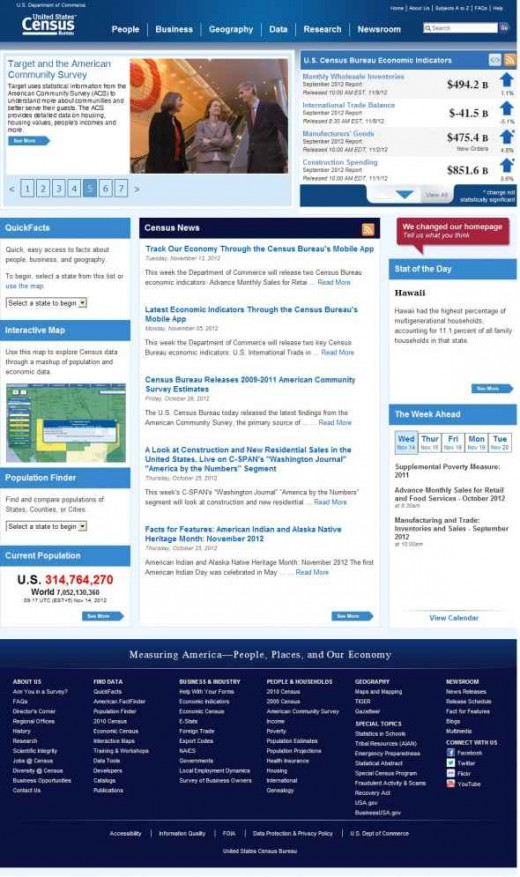
Did You Notice the Red Text Box at the Top?

_________________________________________________________________

Free Website Magazine
Stay informed with a constant source of information for creating successful websites with a free subscription to Website Magazine.
Your subscription to this print magazine, including postage, is free for U.S. addresses – other countries are $30 per year. Not only that, when you subscribe a tree will be planted in your name by ReplaceATree.org.
Get your free subscription to Website Magazine
_________________________________________________________________

Debunking the Myths
According to InternetWorldStats.com, there were only 7,000,000 users of the Internet in 1997, 1.7% of the world's population. Today, there are over 2,749,000,000 users, about 38.8% of the global population. Times change. Equipment changes. We no longer write Web pages; we write webpages. And as content writing has evolved, today there are very few differences between online writing and offline writing.
It's high time we debunk the old fuddy-duddy myths of content writing.
1. "People scan Web pages and rarely read them." Wrong. People scan webpages and newspapers until they find something of interest to them and then they're glued to the article until its conclusion.
2. "Don't write clever subheadings." This was never true, except for non-clever writers.
3. "Web pages should use bulleted lists." This is only true when and where they are useful; otherwise, no webpage needs them. I have yet to see a bulleted list on a Wikipedia article.
4. "Write short sentences." Sure, write short sentences – along with medium sentences and long sentences.
5. "Always use one idea per paragraph, not many ideas." This is great advice for elementary school children just learning to hold their little pencils.
6. "Use the 'inverted pyramid', newspaper style, starting with the conclusion." This only applies to news stories. Who wants to hear the punch line before the joke?
7. "Use half the word count than in conventional writing." Yeah, right. The Wikipedia article for Barack Hussein Obama II runs 25,588 words with 30 words added in the time it took me to do a word count. SEOmoz.org posted a study once that disclosed the best traffic was to one of its blog posts of 5,000 words.
"Begin at the beginning, and go on till you come to the end: then stop."
– King of Hearts to the White Rabbit in Lewis Carroll's Alice's Adventures in Wonderland.
"How long should a webpage be? Like any other writing, it's like the length of a woman's skirt: long enough to cover the important things and short enough to be interesting."
– Writer Fox™
"There's no such thing as copy that's 'too long' but there is copy that's 'too boring.' "
– Gary Halbert (1938 - 2007), direct-response marketer
"The truth about long copy is that, first of all, there's abundant, legitimate, statistical, split-testing research to indicate that virtually without exception, long copy outperforms short copy."
– Dan Kennedy, marketer, and editor of dankennedy.com
8. "Use a scannable layout." No. Match your layout to the text.
9. "Use neutral rather than subjective language." Neutral isn't normal. Neutral is just plain-potato boring.
"Readers want the person who is talking to them to sound genuine."
–William Zinsser, American journalist and author of On Writing Well
10. "Avoid writing long pages of content because users are reluctant to read more words and scrolling is extra work." Oh, puleeze!
All of this content writing advice belongs in the last century from whence it came, along with the monochrome monitors and the dial-up modems.


Top 10 SEO Copywriting Tips
1. Neither read nor follow stale advice on content writing.
2. Take your examples for effective content writing from content writers whose work you actually read and enjoy, and from writing that is on-topic for the things that interest you personally.
3. Read. Read online and offline content. Consume content with a hunger.
4. Do your homework. Do your research. Then, if you don't know more about the topic than you think your potential readers do, don't write on that topic. (Don't write about mortgages if you have trouble spelling the word.)
5. Don't be SEO-stupid. Learn what SEO is and find SEO tips. If you want to be a successful online content writer, learn everything you can about search engine optimization and stay up to date. If you're in to writing for the money, the ego, the hobby, whatever your agenda, your writing will fall into the black hole of cyberspace without SEO.
6. Have no fear. Have courage. Find a new continent, a new planet, a new emotion, a new pathway, a new cure, a new slant, a new conclusion, a new course.
7. Give to your reader. Give your reader exactly what you advertised when you dangled those keywords as bait for his eyes. Don't disappoint. Don't bait and switch. Deliver what you promised. Let your keyword be your bond.
8. Love your reader. Give your reader your very best effort as if he were your very best friend. Be honest, tell him everything you know, disclose the good and the bad, refer him to other sources you know will help him, give him your time, give him your all. Don't hurt him. Don't trick him. Don't sell him snake oil or old wives' tales. Treat him as you would want to be treated when you are seeking information, answers or solutions.
9. Leave him satisfied. Let no one leave your webpage hungry. Like entertaining dinner guests, keep serving until the guests can eat no more. And when they leave the table, send them home with a basket of food to satiate. You should serve your content as more than a plate of food; serve it as a full banquet table for the finest of guests.
10. Tell him a story. Since earliest childhood – well before you could even read yourself – stories fascinated you and still do. This is what journalists call 'human interest' features. Find a human example for your text. Share that story. Implant the story in your reader's heart and mind as the takeaway.
What is Good Content Writing?
Website content writing is writing. Period.
So, what is good website content writing?
Good website content writing is good writing. Period.
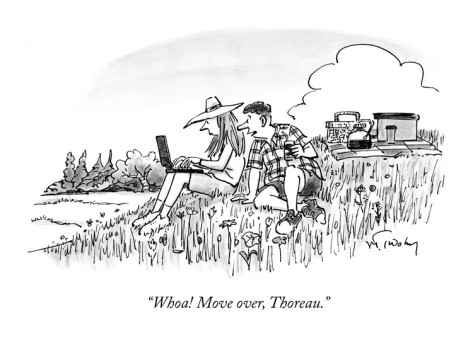
Check out the Web Writer print of this New Yorker cartoon. (It's a great gift of inspiration for a writer!)
"Defining good Web content writing is like defining pornography: difficult to define, but you know it when you see it."
– Writer Fox™

Outsource Your Website Content Writing
Freelance Sites
If you can't do it yourself, you can hire it. The Web is filled with freelance and outsourcing agencies that offer Web content writing services. However, proceed with caution.
Here is a typical job posting on one of those sites:
"I am looking for articles on the subject nutritional-digestive health benefits [say what?]. I want 25 articles, 500 words each, and am willing to pay $63."
No, that's not $63 dollars per article; it's for all 25 articles. Put a pencil to it. That's 12,500 words for less than half-a-penny per word. For an excellent, experienced writer to research that topic and complete that assignment, with original and engaging content writing, it will take at least four weeks.
Yet, there are writers who will respond to such a posting – writers who use software programs to generate spun content from a Wikipedia article or writers who write in broken English and live in Bangladesh.
Content Writing Costs
Many people find their website content writers through freelance sites, choose the lowest price bidder on their project, and feel so proud of themselves for saving a truckload of money on the content for their websites.
These people miss the point.
Your website content writer should make you money, not cost you money. Web content writing is about pushing the envelope of income potential for your product, service or non-profit venture.
Quality content writers will charge between $0.25 and $1.25 for a single word of content. Find a writer that charges within this range to narrow your search.

Cultural Compatibility
It should be obvious that a content writer from Bangladesh doesn't know diddly squat about American homeowner's insurance, and vice versa. Yet, people contract articles by Bangladeshi writers every day for this subject. The results, of course, are pitiful.
If your target audience is the United Kingdom and the Commonwealth, hire your writer from that group of nations. If your target audience is American, your content writer should be, too. If not, you'll be given a cookie when you asked for a biscuit, underwear when you asked for pants, a mum when you wanted a mom, and a soccer ball when you asked for a football.
More importantly, you'll lose the trust of your audience if your language sounds foreign.
The photo (courtesy of Wikipedia editor Lou Sander) shows the American version of the word biscuit on the left and the British version on the right.
Knowledge and Experience
If the topic of your website is beyond the general knowledge of most people, hire an expert in the topic field. Because most online writers are published without a byline, check newspaper sites to find journalists with knowledge of your main themes. Also, look at magazines in your industry to find great writers who understand your subject.
Ask for experience. Experienced content writers have samples of their work online. Approach that content as a typical website visitor and judge it by your reaction.
Insist that the writer you choose has SEO copywriting experience. This will be critical to the success you achieve with the content in garnering traffic from search engines.
There are no silver bullets for writing persuasive Web content, but there are sterling content writers. Either become one, or hire one.

Quality Content Writing and Quality Venue
If you are not dealing with the content of your own website but, rather, posting your articles on the websites of others, your copy may not find the success it deserves. Part of the Google Panda changes that began in February, 2011, demoted sites from search engine results that contained too much low quality content. As a result, many websites fell to dissatisfaction with Google and carried some quality articles down into the dungeon of search ranking with them.
Quality content writing must have a quality venue. It is the difference between a stellar article on finance appearing in The Wall Street Journal or appearing in the local supermarket's freebie, throwaway paper.
I'll tell you a story that you will never forget.
On a bleak January morning, at the peak of the get-to-work rush hour at the Washington D.C. Metro, a man wearing a black shirt and a black baseball cap entered the train station. He was carrying a black case.

He gently put the case on the floor, carefully opened it, and lifted out a $3.5 million Stradivarius violin. He cradled the instrument under his chin and began to play Chaconne from Johann Sebastian Bach's Partita No. 2 in D Minor, which one maestro violinist described as "not just one of the greatest pieces of music ever written, but one of the greatest achievements of any man in history."
The man played the classics for 43 minutes. A few passersby tossed coins into the open violin case on the floor at his feet. Almost no one stopped to listen. He was largely ignored.
The recital, recorded by a hidden camera, was sponsored by The Washington Post as a social experiment. It's painful to watch.
The violinist, you see, was Joshua Bell, recipient of the Avery Fisher prize for the best classical musician in America. In the prior week, he played before standing-room-only audiences at the North Bethesda Music Center at Strathmore and at the Library of Congress.
Bell earned $52.17 from all of the traffic at the busy terminal, which included $5 dropped by a man who knows a "superb violinist" when he hears one and a $20 bill given by a woman who had seen his performance earlier at the Library of Congress. A single ticket to a Joshua Bell concert goes for about $100, which usually nets Bell, according to The Washing Post, about $1,000 a minute.
Why didn't Bell attract an audience and a higher income from all of that traffic at the train station? Like some great writers, the man was playing in the wrong venue for his genius.
Washington Post journalist Gene Weingarten won the Pulitzer Prize for his article about the Joshua Bell performance at the subway station. (The online article has 7,429 words, no bullet points, no inverted pyramid style, 100-word paragraphs and some single-sentence paragraphs, no scannable layout, no 'neutral language', but is an example of link bait at its optimum with over 200,000 inbound links.)
The two-minute excerpt of the recording of Bell's train station performance has received over 4.9 million views (and counting) on YouTube.
Traffic Passing By
The Right Venue - You Must See This!
Watch at least two minutes of the video below (five is best!), then just let it play in the background while you finish reading this article.
The same man in black, the same priceless instrument. One performance was rewarded with a few coins as tossed to a beggar. The other was given a massive standing ovation from an astute crowd of music connoisseurs.
High quality content writing, like high quality music, deserves the best platform.
If you are an online content writer, here is a writing venue you should explore.
_________________________________________________________________
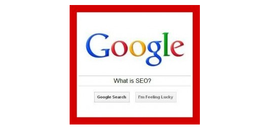
Related Content
Writing Online
Learn more about website content writing in these articles.
Read a systematic approach to SEO in this comprehensive, free guide:
____________________________

Learn how to write website content to please the Google Panda algorithm for quality content:
____________________________

Learn what the Google Penguin algorithm targets in website content:
____________________________

Find out about the duplicate content penalty and how to avoid receiving one.
____________________________

Learn how to optimize press releases for search engines.
____________________________

Read over 100 quotations about the World Wide Web, including quotes about SEO and quotes from the founders and employees of Google.com:
____________________________

Want to earn money working online? Join the Writer Fox Writers Den.
Connect with Writer Fox™ on Google+.


Share - Don't Copy.





